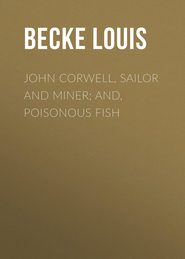По всем вопросам обращайтесь на: info@litportal.ru
(©) 2003-2024.
✖
Tessa
Настройки чтения
Размер шрифта
Высота строк
Поля
“After that, my dear Christian friend, with the rudely executed diagrams in sticking-plaster on the facial cuticle, my pious churchwarden with the large family of interesting girls—after that, Miss Tessa Remington will be glad to marry Mr. Samuel Chard, inasmuch as when she awakes it will be under the same improper conditions as those of the dissolute Tim Donnelly and the flighty Miss Maoni; for the beauteous Tessa will be fortuitously discovered by Captain Louis Hendry and several other persons on board, in such circumstances that an immediate marriage of the indiscreet lovers by one of the American missionaries at Ponapé will present the only solution of what would otherwise be a ‘terrible scandal.’”
“And what will you do with this fellow Carr?”
“Chuck him ashore at the Mortlocks,” replied Chard with an oath; “we’ll be there in a couple of days, and I’ll kick him over the side if he turns rusty. Hillingdon doesn’t like him, so we are quite safe.”
“When is the love-making to come off?” asked Hendry, with a fiend-like grin.
“As soon as we are clear of Carr—or sooner; to-night maybe. We must log it that he was continually trying to cause the native crew to mutiny, and that for the safety of the ship we got rid of him. Hillingdon will back us up.”
Tessa did not appear at supper. She kept to her cabin with Maoni, her dear Maoni, who, though but little older than herself, was as a mother to her; for the native girl had been brought up with her and her sisters from their infancy. And as Tessa lay back with her dark head pillowed against the bosom of the native girl, and sobbed as she thought of her lover lying in the deck-house with the handcuffs on his wrists, Maoni pressed her lips to those of her mistress.
“Lie there, little one, lay thy head on my bosom,” she said; “‘tis a bad day for thee, but yet all will be well soon. These sailor men with the brown skins will not let thy lover be hurt. That much do I know already. Speak but one word, and the captain and the big fat man with the black eyes will be dead men.”
Tessa smiled through her tears. “Nay, Maoni, that must not be; I desire no man’s death. But yet if he be not set free to-morrow trouble will come of it, for he hath done nothing wrong; and the brown men, as thou sayest, have a strong friendship for him.”
“He shall be set free to-morrow,” said Maoni, with quiet emphasis. “The brown sailor men have talked together over this thing, and they say that they are ready at thy word to make captive the captain, the big fat man, and all those white men who tend the great fires in the belly of the ship.”
Tessa knew that the half-dozen of white firemen and stokers were on bad terms with the native crew. They were a ruffianly, drunken set of scoundrels, and their leader, a powerfully built man named Donnelly, had grossly insulted both the first and second mates. He was an especial protégé of the supercargo, who, as well as the captain, secretly encouraged him and his fellows to annoy and exasperate the two officers and the chief engineer.
They remained in their cabin talking together in low tones and without a light till they heard eight bells strike; and ten minutes afterwards, just as they were going on deck, some one tapped at the cabin door.
“It is me, Miss Remington,” said the voice of Oliver; “please let me come in for a moment. Be quick, please, as I don’t want the captain to know I am here.”
Tessa at once opened the door. “Come in Mr. Oliver. But we have no light.”
“Never mind that, miss,” he said in a low voice, carefully closing the door and then bolting it, “I cannot stay long. I came to warn you that there is likely to be trouble tonight about Mr. Carr, and you had better not come on deck. Keep to your cabin, and don’t open your door to any one except myself, the second mate, or the steward. The native crew are in a dangerous state of excitement, and I am sure they will attempt to liberate Mr. Carr before morning. Both the captain and Chard are more than half-drunk; and the chief engineer tells me that for some reason they have given liquor to the firemen and stokers, who have set him at defiance. I fear, I fear greatly, miss, that some calamity may occur on board this ship to-night. Therefore I beg of you to keep to your cabin.”
“Thank you very much, Mr. Oliver. We certainly did intend to go on deck and remain some hours, but shall not do so now. But tell me, please, have you seen Mr. Carr? Is he well?”
“Quite well. I saw him a few minutes ago, and he bade me tell you to have no fear for him. I am now again going to Captain Hendry to ask him, for his own and the ship’s safety, to set Mr. Carr free. If he refuses I cannot say what will happen.”
Tessa put her little hand upon the mate’s huge, rough paw, and looked into his honest, troubled eyes through the darkness.
“It is good of you,” she whispered. “Oh, do try, Mr. Oliver, try your best to make the captain set him at liberty.”
“Indeed I will, miss,” replied the mate earnestly, as he pressed her hand, and went softly out into the main cabin. He stood by the table for a minute or two, thinking with wrinkled brow of the best way to approach the captain and bring him to reason. Presently he sat down, took his pipe from his pocket, filled it, and began to smoke.
A heavy step sounded on the companion steps, and Chard descended somewhat unsteadily, and calling for the second steward—who was in the pantry—to come to him, brushed past the chief officer, and went into his own cabin.
The second steward—a dirty, evil-faced little cockney named Jessop, whom Oliver and his fellow officers particularly abhorred—at once followed the supercargo in to his cabin, which was immediately closed. In less than five minutes it opened again, and Jessop came out and returned to the pantry, and presently Oliver heard the rattle of cups and saucers as the man made preparations for the coffee which was always served to Hendry, Chard, Carr, and Tessa and her attendant, and the officer on watch at nine o’clock every evening.
“Would you like a cup of coffee, sir, as you have not turned in?”
It was Jessop who was speaking, and Oliver looked up in some wonder, for the man knew that he disliked him, and indeed he (Oliver) had once smartly cuffed him for creating a disturbance for’ard with the native crew.
Most fortunately for himself, Oliver did not want any coffee, so merely giving the man a gruff “No, thank you,” he rose and went on deck.
The moment he was out of the cabin Chard appeared, and looked inquiringly at the second steward.
“‘E won’t ‘ave any, blarst him!” said the man, speaking in a whisper, for Latour, the chief steward, was in his cabin, which was abreast the trade-room.
Chard uttered a curse. “Never mind him, then. Sling it out of the port or you’ll be giving it to me instead perhaps. Are the other two cups ready?”
The man nodded. “All ready, but it’s a bit early yet.”
“That doesn’t matter. Pour it out and take it to them—the sooner the better.”
Chard, whose dark face was deeply flushed, sat down at the table, lit a cigar, and watched his villainous accomplice place the two cups of coffee with some biscuits on a tray, take it to Miss Remington’s door and knock.
“Coffee, ma’am.”
“Thank you, steward,” he heard Tessa’s soft voice reply as Maoni opened the door and took the tray from Jessop.
The supercargo rose from his seat with a smile of satisfaction. The crime he meditated seemed no crime to his base and vicious heart. He merely regarded it as a clever trick; dangerous perhaps, but not dangerous to him; for deeply steeped as he was in numerous villainies he had never yet been called to account for any one of his misdeeds, and long immunity had rendered him utterly hardened and callous to any sentiment of pity or remorse.
He went on deck and walked leisurely for’ard till he came abreast of the funnel. A big swarthy-faced man who was standing near the ash-hoist was awaiting him.
“Are you sober enough, Tim, not to make any mistakes?” asked Chard, leaning forward and looking eagerly into the man’s face.
“Just as sober as you are,” was the reply, given with insolent familiarity. “I’ve kept my head pretty clear, as clear as yours and the skipper’s, anyway.”
The two conversed for a few minutes, and then separated, the supercargo going up on the bridge to join his jackal. Half-way up the ladder he heard the sound of angry voices. Hendry was quarrelling with his chief officer.
“Go and keep your watch below,” said the captain furiously, his bloodshot eyes glaring fiercely upon the mate. “I tell you that I’ll keep the beggar in irons till he rots in them, or until Mr. Chard kicks him ashore.”
“Very well, sir,” said Oliver quietly, placing his hand on the bridge rail to steady himself, for the Motutapu was now plunging and labouring in the heavy head sea, and Hendry was staggering about all over the bridge—“very well. But I call on Mr. Atkins here to witness that I now tell you that you are putting the ship into great danger.”
“Say another word to me, and by God I’ll put you with your friend Carr to keep him company!” shouted Hendry, who had now completely lost control of himself.
Oliver smiled contemptuously, but made no answer. He at once descended the bridge, and in the starboard alleyway met the chief engineer.
“This is a nice state of affairs, Oliver. Those blackguards of mine are half-drunk, and unless I get some assistance from the captain I can’t keep up steam. They won’t work and are saucy as well.”
The mate shook his head. “You’ll get no help from the captain. He and I have just had a flare-up. He’s half-drunk himself, and threatened to put me in irons. And none of the native crew will go into the stokehole, that’s certain.”
“Well then, something serious will happen. I can keep her going at four or five knots for another hour or so, and that is all I can do. The second engineer and myself are dead-beat. She’ll broach-to presently, and then you will see a pretty mess.”
“I can’t help it, Morrison,” said the mate gloomily, as he went to his cabin.
Up on the bridge Hendry and Chard were talking and looking out ahead. The second mate, a young, muscular man, was standing by the wheel, and giving a word of warning now and then to the native helmsman, who was Huka. Although it was not blowing hard the sea had increased greatly, and every now and then the steamer would make a plunge into a mighty valley of darkness, and only struggle up out of it with difficulty. Careful steering was a necessity, for the ship was not steaming more than four knots, and the least inattention might result in serious consequences.
“Look out for’ard!” Atkins shouted, as he saw a particularly loose, knobby sea rise suddenly up over the starboard bow. His warning was just given in time, for in another moment down dropped the black mass of water on the well deck with a thundering crash, burying the steamer completely from the bridge to foc’scle head. She rose slowly, very slowly.
Hendry lurched up towards the helmsman.
“You damned, red-hided kanaka! Couldn’t you see that coming?” and he struck the man a violent blow on the mouth. In an instant Huka let go the wheel, swung himself over the rail on to the deck, and ran for’ard. Atkins looked at his captain with suppressed rage as he seized the wheel, and then began to watch for the next sea.
Five minutes passed, and then a dozen dark figures made a sudden rush towards the deckhouse in which Carr lay in irons. Then came the sound of smashing blows as the door was burst open with an axe, and in a few seconds Carr was brought out upon the main deck and quickly freed from his irons by Malua, to whom a duplicate key had been given by the second mate.











